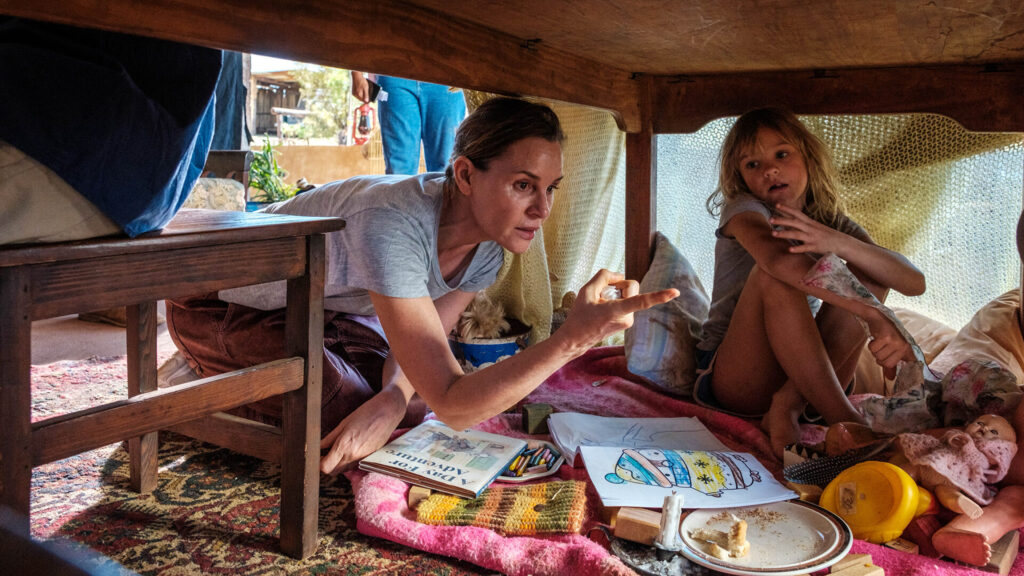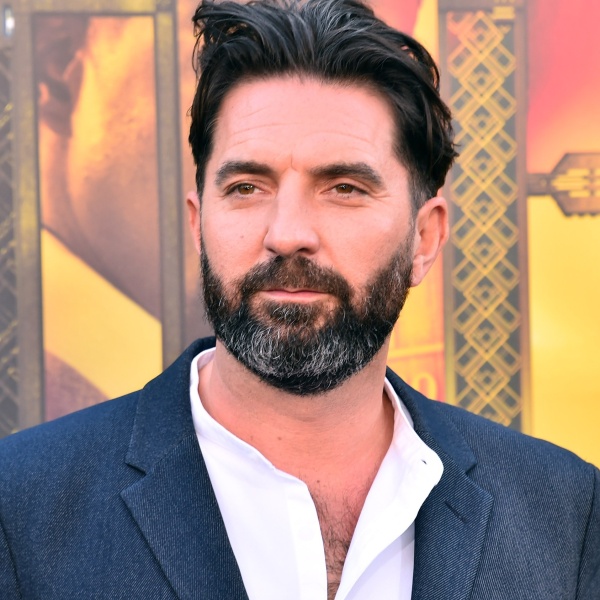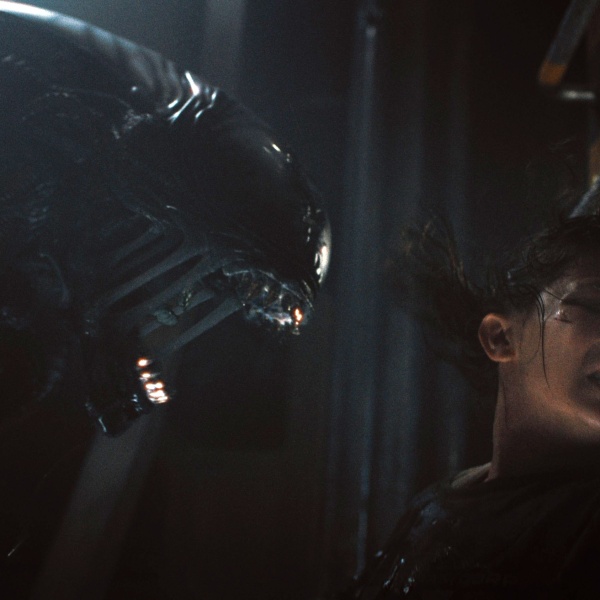When Embeth Davidtz wanted to adapt “Don’t Let’s Go To The Dogs Tonight,” Alexandra Fuller’s bestselling 2001 memoir about living in Rhodesia (now Zimbabwe) with her white farming family, she delivered an impassioned pitch to the author. “I know how to tell this story,” Davidtz told her. “I know it in my bones.”
Best recognized for her striking work in “Schindler’s List,” “Bridget Jones’s Diary,” and, recently, “The Morning Show,” the versatile actor indeed deeply understood Fuller’s story, a collection of memories that unfold as Rhodesia’s 1980 election that would eventually morph the country into contemporary Zimbabwe nears, amid a political climate that both underscores and rejects the country’s blatant racism. While Davidtz herself hasn’t lived in Zimbabwe, she has roots in neighboring South Africa, along with memories of witnessing violence and racism like the film’s seven-year-old protagonist, Bobo (first-time actor Lexi Venter in a revelatory performance).
“My parents are South African,” Davidtz said during a sitdown with IndieWire at the 51st Telluride Film Festival, where her debut as a writer/director world-premiered to positive response and reviews. “They were studying in the States. I was born there, and then our life was uprooted, and we moved to South Africa when I was eight. Bobo reminds me of arriving at South Africa, being in a poor family with an alcoholic parent in a country that was so racist. I was a child that suddenly had this separation between what I was seeing, and what I knew to be right or wrong. I was seeing how casual the racism was. You know, the benches said, ‘Whites only.’ It was still that time.”
Elegant, stylistically assured, and visually articulate, the film unfolds entirely from the perspective of Bobo, who runs around with animals at the shabby farm, dirty and barefoot, observes her father Tim’s (Rob Van Vuuren) and alcoholic mother Nicola’s (Davidtz) struggles and copies all the racist remarks she’s heard from her parents, parroting them to her family’s Black servants, Sarah (Zikhona Bali) and Jacob (Fumani N. Shilubana). Through Bobo, Davidtz both emphasizes the cost of what children inadvertently perceive, and how racism is passed down through generations.

Heading to the Toronto International Film Festival next, Davidtz still can’t believe her film just made its first bow in the Colorado mountains. “People use that word surreal; it’s absolutely that. It’s pinch-me. It’s I can’t believe it,” she said. “I was in prep just this time last year. And I knew Telluride was a big deal, but I didn’t know how much of a big deal. You raise a tiny amount of money. You work on something, you put it out there. It’s a gift, and one of the biggest of the thousand miracles so far.”
The following interview has been edited and condensed for clarity.
It’s surprising that the book was written in 2001, and it took this long for someone to adapt it. What was your way into adapting it for the screen?
The book was a big hit in 2001, and someone bought the rights then, sat with it, attempted to crack the screenplay [but couldn’t]. It is actually a 22-year memoir. My desktop is littered with the drafts that I wrote. I first started by writing the whole thing: the young Bobo, the middle-aged, then the older. Then at one point I gave it to somebody else, and she didn’t even know the direction to go in. Then I gave it to Alexandra. I adore her writing, but she went completely off on a tangent. And so I said, “Alexandra, I love you. But I’m going to take it.” And she’s like, “Go for it.” So I isolated myself and chose one window through the child’s eyes. That was the thing that made it work. I borrow heavily from the book as Alexandra writes dialogue very well. Like when Bobo is younger, she would say, “I can fire you if I want” [to Sarah]. That was Alexandra.
I’m worried because Alexandra hasn’t seen the film yet. She will in the next couple of days. I don’t want to give away what I did with the ending to anybody, but she could hate [the ending]. I completely reshaped it.
What was it like to reconcile with your childhood through making this film?
It’s super painful in some ways. I left South Africa [about] 35 years ago. And I would only go back to visit family. But you carry [your childhood], right? My family moved to Africa, but my father stayed behind, still lecturing in the States. My mother got very ill. My little sister was sick. I just remember bells rang at school. South Africa was in a military state. There are moments in our life, especially in childhood, where you are snapped, like your DNA gets affected by something. Then you come back to it 35 years later, and that DNA starts to light up like a cat scan.
Something in me started to recognize the things that I thought and felt as a child. I’ve always been fascinated by the stories from children’s point of view. It’s why I think “Empire of the Sun” had such an impact on me. That little boy, somewhat neglected… That was my experience, with racial tension, with massive amounts of violence. You would see things as a child, people beaten up, thrown in the back of a police van. I remember walking home from school in the early days after getting there and seeing very violent arrests take place.
And then I come back and see South Africa so changed. It’s more integrated in many ways than America is. But the blueprint of it all were laid down, [like it was in] Zimbabwe. What happens when you get back the inheritance of what’s been spoiled and taken? Now the whole organism is something that’s been deformed because of colonialism.
I had to act out all those [racist] scenes in front of my largely Black crew and be that woman that says racist stuff. I love my assistant director so much. He’s a Zulu man, Thabani Gigaba. I do this terrible scene, we called cut, and he was so funny — he went like this [shows middle finger and laughs]. And I said, “I’m sorry, I’m so sorry.” I was devastated after some of those days. It’s stuff that I saw as a child and I was white. In some way, you are white, you are complicit, you just are. So I’m trying to exorcise something out of my soul. It’s largely Alexandra’s story, I don’t want to overlap and step on [her] toes. But I wove in a ton of things that were my own.
On that note of hard shooting days, and the difficult topics you depict like racism, sexual assault, alcoholism — how did you make everyone, especially the children, feel safe in the moment?
I talked to the kids a lot. I explained a lot, because they live in a different world. Their friends are Black, they’re in integrated schools. They are very mature, smart children. I would say to Lexi, “Listen, this isn’t me. You know, this is how it used to be here. And we’re going to show that.”
With that fight under the table between the parents, I had two cameras on her, and I didn’t tell her what was about to happen. I said, “They get into an argument,” but I just ran the camera. She didn’t know it was going to be this knockdown and drag-out fight. If you ever watch her face in it, she is looking, then looking away and then looking. I got it in one take. I didn’t tell her what was coming with the racist stuff. And she wasn’t on set when that big explosion takes place. I turned the camera around and put her there, and did a very toned down version of it.
Lexi Venter gives one of the best performances at Telluride this year. How did you find her?
I knew instinctively that I needed a child who’s never acted before, once I saw the first few kids the casting director brought in. They were overacting. The kids watch too much TV. They’re on their phones and tablets all the time, so they see nonsense. They’re not watching great film performances by Jodie Foster or Christian Bale. So then I went with a casting director that casts for a child reality show. And I said, “I need a wild, untrained, feral, spontaneous creature.” Nobody was close to Lexi; I knew it immediately. She was licking her thumb that had been injured on a piece of pipe that her brother had left out in the sun. The minute I saw her face complaining about her brother, I was like, “That kid.” And then I met her at her family’s house. And she has this very feral existence. And the little dog [in the movie], the one she ties the thing around her head, is her dog.
What about the rest of the cast? Did they and Lexi have some time to spend with each other?
Spielberg taught me this: Casting is everything. I saw Zikhona Bali and [noticed] the serenity of her. She’s like a glass of cold water, unflappable. Her aura is amazing. She was beautiful with the child, and I knew it. And she’s never acting. She just simply says a line. Fumani N. Shilubana has this stature, this beautiful voice. I gave them the kinds of notes I wished I’d been given as an actor. I just said, “You are the keeper of the land. You have no racial resentment to play. You stand in your power as the man whose ancestors came from this land.” They didn’t get as many close-ups as I would’ve liked to have given them. God, I wish I just had had more time. But I think I had enough.
You’ve mentioned giving them the kinds of notes you wish you were given. What else did you bring from your acting career to the director’s chair? You’re obviously able to speak an actor’s language, and anticipate what they need.
Yes, that’s the gift. I was talking about this with these amazing student fellows who come here to Telluride. I just said, “For any of you guys in the room that are directors, cinematographers, writers, you have got to nurture actors and make their imaginations alive. Give them the space, give them a secret right before you do a take. And careful how you give direction, how you break them down. Give each actor with even the smallest part some little nugget that they can bring to life because then they won’t be bored. Don’t leave them standing around very long, especially children. Keep them occupied.” For [my film], we had no money. But I took my own credit card and created a room for the kids. I bought coloring stuff, big rolls of paper. So the kids were drawing and playing.
So these are the things I learned. Don’t hem [the actors] in. Don’t make something super technical because it’s so draining. There are directors I’ve worked with that make you do a thousand takes. I did as few takes as possible, as the kids would just get tired. So I had to adjust to getting in very tight with the camera very quickly.
What was the toughest day you had on set? There’s this saying that you shouldn’t make movies with animals, with children, or with water. And you checked two out of those three boxes.
[Laughs] My God. In some way, the toughest day was when we were shooting the group shots with the adults because I was trying to cover that room from the child’s point of view. But I also had really important things in the dialogue that I needed to get in. Like, “The election results come out tomorrow.” And, “They just left the bodies there, and the dogs ate them.” I wanted to hear these snippets and the camera needed to move. I did something where I actually wanted the children running through it to lead the camera. It was a nightmare because the children had never done it before. And then I had this complicated Steadicam. In the end, I cut all of that stuff, used some voiceover and snippets. I watched Jason Reitman’s film [“Saturday Night”] last night, and I was just like, “Jason, how did you do that?”
Right, it’s incredible.
It is incredible. We’re friends and I said, “I don’t want you to go and see my movie now. And he was like, “Fuck off.” And I said, “No, I don’t want you to.” Because I plodded along with a little camera. What he did, I couldn’t even conceive of doing something like that. So I need to learn as a director how to manage something that massive. In a weird way, as a first-time director, shooting something on such an intimate scale, seeing the magic of a dirty foot and a hand, or pills on a side table, or the color of the alcohol, that’s a world I can get. But wow. Something moving and massive like that, I could never do.
You’ve so rightly said earlier, “If you’re white, you’re complicit.” And that is something we’re seeing every day in every country. Are you hoping to encourage that conversation with your film?
Someone might ask, “What do you do this for? What do you want to show this child for?” I want to show what children see. What are the kids in Gaza seeing every day? What is imprinted? The way I sat in that moment in time was seared into my cells, my DNA. And when the child that leaves, what do they go off with into the world? I hope that people [consider] what a child is seeing with any violence, any act of oppression, even internally in a home. I didn’t want my parents to be fighting, so that’s on the micro level. On the macro level, look what war does to kids.
“Don’t Let’s Go to the Dogs Tonight” premieres Friday, September 6 at the Toronto International Film Festival. It is currently seeking U.S. distribution.



